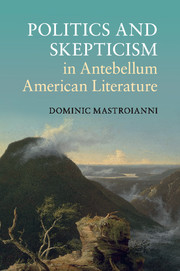Book contents
- Frontmatter
- Contents
- Acknowledgments
- Introduction: secret springs
- Chapter 1 Moods and the secret cause of revolution in Emerson
- Chapter 2 Revolutionary time and democracy’s causes in Melville’s Pierre
- Chapter 3 Hawthorne and the temperatures of secrecy
- Chapter 4 Causes of falling, Civil War, and the poetics of survival in Dickinson’s Fascicle 24
- Conclusion: antislavery writing, skepticism, and scorching words
- Notes
- Index
Introduction: secret springs
Published online by Cambridge University Press: 05 November 2014
- Frontmatter
- Contents
- Acknowledgments
- Introduction: secret springs
- Chapter 1 Moods and the secret cause of revolution in Emerson
- Chapter 2 Revolutionary time and democracy’s causes in Melville’s Pierre
- Chapter 3 Hawthorne and the temperatures of secrecy
- Chapter 4 Causes of falling, Civil War, and the poetics of survival in Dickinson’s Fascicle 24
- Conclusion: antislavery writing, skepticism, and scorching words
- Notes
- Index
Summary
A few days after Ralph Waldo Emerson’s death in 1882, Emily Dickinson wrote to her friend or lover Otis Lord, declaring that “the Ralph Waldo Emerson – whose name my Father’s Law Student taught me, has touched the secret Spring.” Dickinson’s “secret Spring” draws together three concepts, corresponding to different senses of the word spring, that converge at the center of my book. First, a secret spring is an originating cause, understood by comparison with certain natural phenomena. On one hand, this secret spring evokes the source of a stream, as Emerson does when he asserts: “Man is a stream whose source is hidden.” On the other hand, “secret Spring” names a season of rebirth, whose work goes unnoticed: something like the season Samuel Taylor Coleridge imagines when he writes, “The Frost performs its secret ministry.” Unlike the secret headspring that depicts vital power as pushing up out of a particular piece of ground, the secret springtime portrays power as working atmospherically and for a particular period of time.
Dickinson’s “secret Spring” also suggests a mechanical device the touching of which grants access to something hidden. For instance, in Nathaniel Hawthorne’s The House of the Seven Gables (1851) the multigenerational conflict between the Pyncheons and the Maules turns on competing claims to an “Indian deed,” whose hiding place in a wall of the Pyncheon house is disclosed dramatically when the artist Holgrave touches a “secret spring.” This kind of secret spring is a piece of artifice, a “contrivance,” as Hawthorne puts it, that allows the unknown to be made known. Such a secret spring represents unknown but discoverable technical knowledge. The kind of secret spring that permits access to useable power necessarily involves one in questions of technique, law, norm, code, calculation, and prediction. In short, this “secret Spring” is a metonym for everything that links knowledge to action. Such a spring underscores the importance of secrecy in politics.
- Type
- Chapter
- Information
- Publisher: Cambridge University PressPrint publication year: 2014



